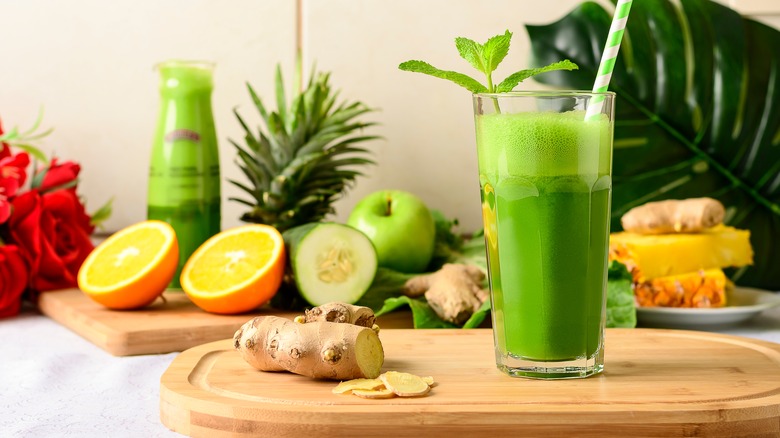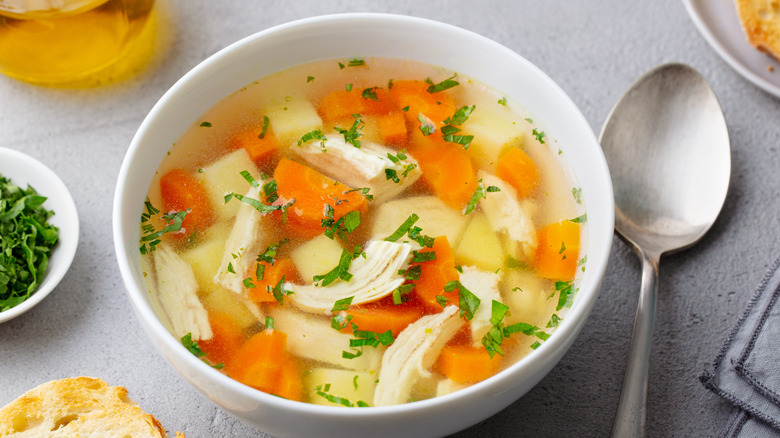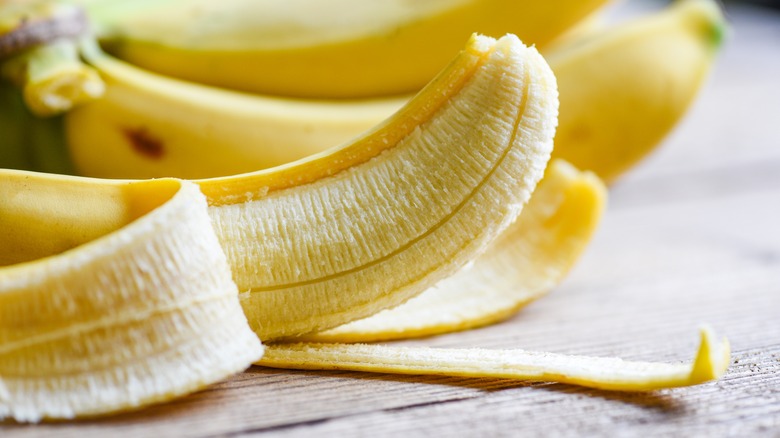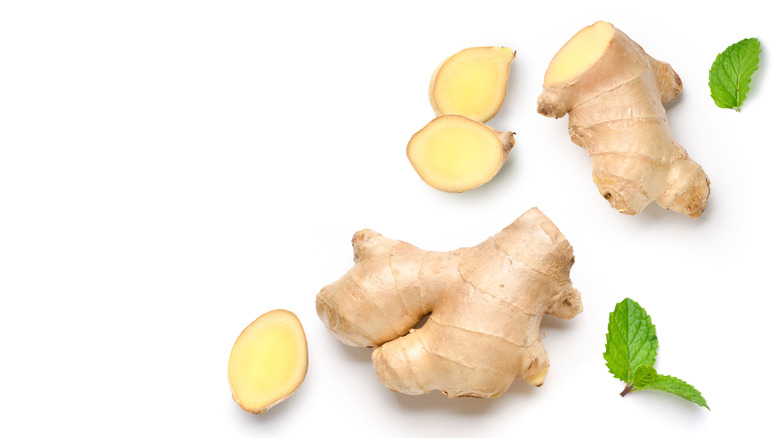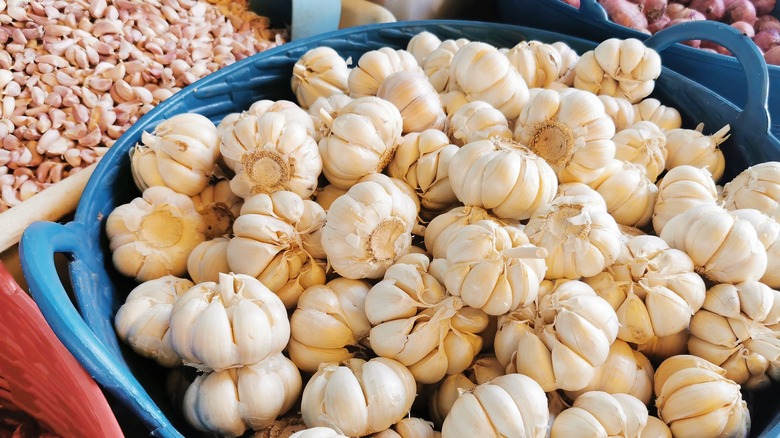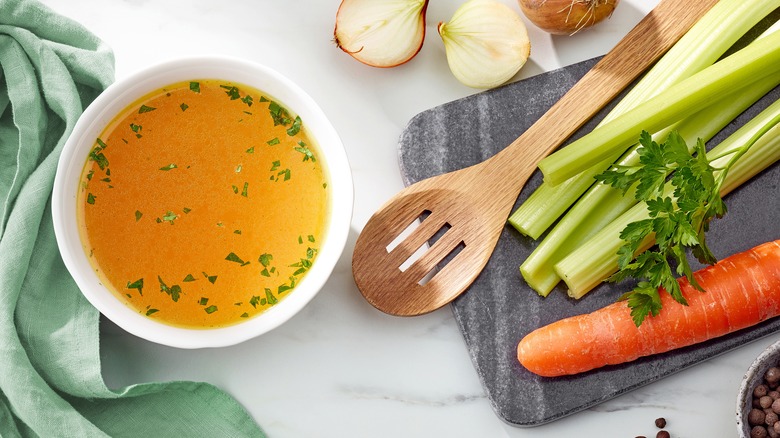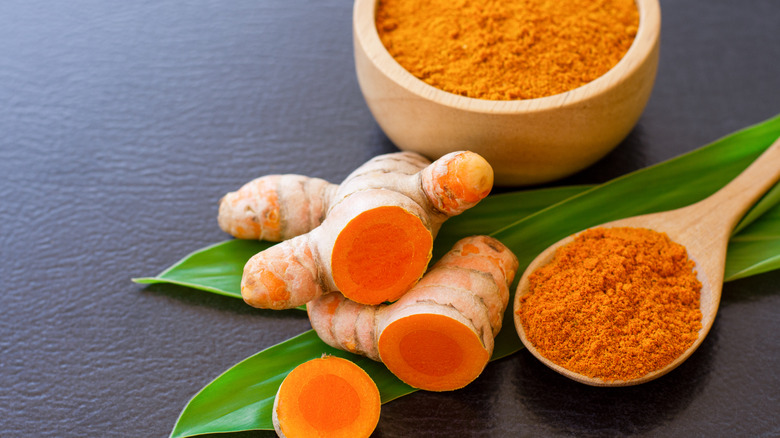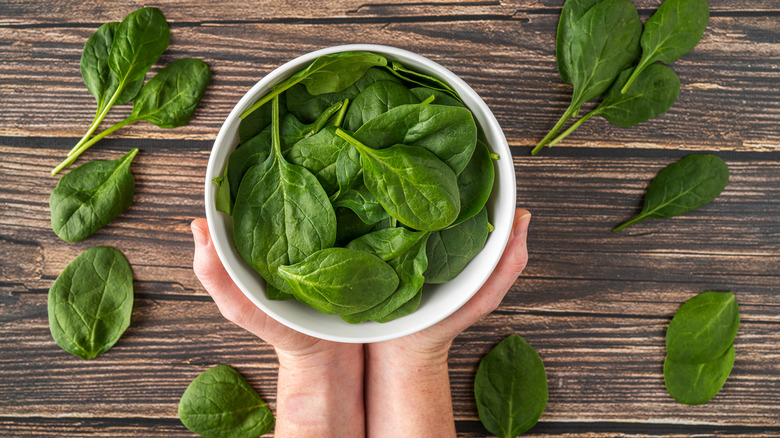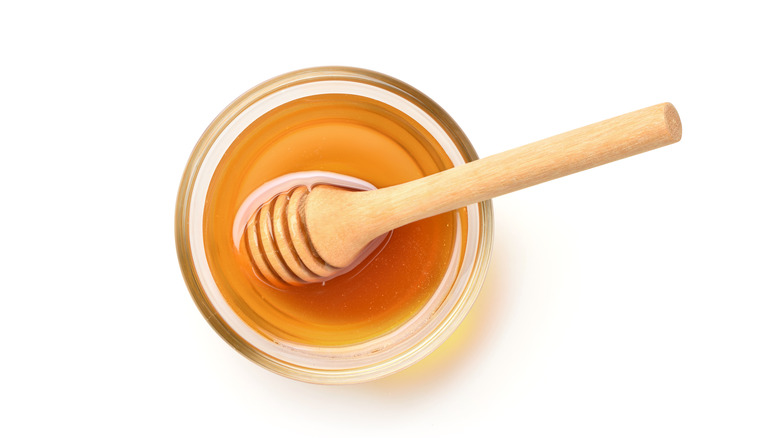15 Foods To Eat When You're Sick With The Flu
As temperatures start to drop, the chilly season brings along a familiar old face: the flu. And although we've all dealt with influenza dozens of times, each new one feels like a whole new hell to bear, with symptoms like fatigue, runny nose, fever or chills, body aches, headaches, sore throat, cough, and sometimes, upset stomach and diarrhea or vomit.
According to the CDC, most of us who get the flu will make a full recovery within a few days or weeks, although some complications, such as pneumonia, ear infections, or sinusitis may arise. Being such a common illness, most of us also know some of the basic ways in which to deal with flu symptoms, such as getting plenty of rest and staying hydrated. However, some foods can aid us in feeling a little better while also increasing our vitamin and nutrient intake, helping our bodies fight the disease.
Herbal tea
A cup of tea is one of the ultimate symbols of comfort, especially when it comes to dealing with the flu. A hot cup of tea is a great way to stay hydrated and can help break up congestion in the respiratory tract.
Herbal teas are popular home remedies — think peppermint or chamomile. Made with dried herbs, fruits, or spices, herbal teas are decaffeinated, so they will not dehydrate you or mess with your sleep. Chamomile is especially helpful when you're dealing with an upset stomach, as it can help reduce muscle spasms in the stomach.
Elderberry tea can also be a helpful aid. This dark berry has antimicrobial and antiviral properties, which will come in handy when fighting the flu. To boost up your teas, you can squeeze some lemon into your tea to add vitamin C, while also adding raw honey is an excellent way to soothe a sore throat.
Fruit juice and vegetable juice
A glass of fresh-squeezed citrus juice, like grapefruit or orange, will bring some much-needed vitamin C into your system when you're dealing with the flu. This longstanding popular wisdom has recently received solid scientific proof, according to a study published in the Frontiers in Immunology Journal. Turns out that micronutrients and bioactive compounds found in citrus fruit support immunity and reduce oxidative stress and inflammation. Drinking an 8-ounce glass of orange juice provides us with more than twice the daily recommended values of vitamin C. Of course, it has to be 100% natural juice.
When it comes to vegetable juices, they can be a good source of antioxidants, too. Think of leafy greens when taking out the blender to make green juice: kale, spinach, and celery bring plenty of vitamins, minerals, and chlorophyll, which not only give greens their color but help support your body's detoxification pathways. You can always add some ginger, lemon, and green apples to make it zestier and tastier. Another perk? If the flu has stolen your appetite, drinking vegetable juice or green juice is a good way to get some nutrients in you.
Chicken soup
Tasty, comforting, and backed by science: What's not to love about chicken soup when we're feeling under the weather? This beloved home remedy not only provides hydration thanks to the broth, but it also packs some nutritious ingredients, such as protein, fatty acids, and selenium. It's also quite light, so it's perfect if your symptoms include an upset stomach.
When it comes to respiratory tract symptoms, their benefits have been praised since the 12th century. But it was actually a much more recent study that proved what our grandmas have been saying for centuries. University of Nebraska Medical Center's Dr. Stephen Rennard conducted a lab study using a home-cooked soup that included vegetables like onions, carrots, and sweet potatoes. Using neutrophils (white cells) from blood donated by healthy volunteers, Dr. Rennard and his team found that chicken soup may have anti-inflammatory abilities.
Follow the BRAT diet
When we're healthy, we usually want to focus on high-fiber foods that will promote digestion, but in times of the flu, fiber can make our stomach-related symptoms much worse. Tummy symptoms can be some of the most painful and annoying when we're dealing with the flu — think diarrhea, vomiting, and nausea. One of the best ways to deal with these is following the BRAT diet, which is basically composed of bananas, rice, applesauce, and toast. These foods are simple carbohydrates that are low in fiber and can keep our stomach stable while making stools more firm.
It's a smart idea to eat these foods in small quantities, too, as we don't want to overload our digestive system. The best part is that they don't take a lot of time to prepare (putting a slice of toast in the toaster or, literally, peeling a banana will just take minutes), so they're perfect for your energy-deprived self.
Ginger
It makes sense that ginger is the star of so many drinks, sweets, and dishes, as its aromatic scent and zesty flavor make its presence undeniable. However, this root is also packed with benefits that will come in handy when fighting the flu.
According to Johns Hopkins Medicine, gingerol, a natural component in ginger, is an excellent aid for nausea relief. It is also highly possible that many of the 400 natural compounds found in ginger are anti-inflammatory, which is good news for those with respiratory issues.
The best way to consume ginger and obtain all of its benefits is to buy it fresh and make yourself ginger root tea. If your energy levels are not at their peak, you can also purchase ginger tea bags. Make sure to add some raw honey — it will taste great and soothe your throat, too.
Garlic
Garlic has the undeniable power to amp up all kinds of dishes with its scent and flavor. Turns out, it can also be of help in times of sickness. According to the Cleveland Clinic, garlic has an organic sulfur compound called allicin, which is not just responsible for its distinctive smell, but also many of its healthy properties. In fact, ancient civilizations like the Greeks, Romans, and Egyptians, were fans of garlic because of its medicinal properties.
For starters, garlic is an anti-inflammatory agent, notes Healthline, which can come in handy when dealing with respiratory tract issues. It also helps boosts immunity and has antibacterial and antioxidant properties. You can make garlic tea (if that sounds appetizing to you), and add lemon and honey, which will act as a decongestant and can calm your cough. You can also choose to add garlic to your meals, like soup or rice dishes.
Broth
Sure, bone broth seems like an inescapable trend these days, but the fact is that broth has been around for centuries. Simmering bones of fish, poultry, or beef in water yields tasty results that can be the base of other dishes or enjoyed on their own. Eating broth when you're sick is an excellent way to stay hydrated, as the electrolytes allow your body to absorb water better. And if you're not feeling very hungry, a nice cup of broth will serve up nutrients while bringing some much-needed comfort. Bonus: The steam in broth can also act as a decongestant.
For a vegetarian option, you can always go for miso soup. Miso paste is made with fermented soybeans and grains. It's a source of probiotics, notes BBC Good Food, so it will help fight infections in your body and help your gut health as well. Also, the fermentation process helps reduce toxins in the body.
Coconut water
Found inside coconuts, coconut water is a clear fluid with a sweet flavor, and though it's also high on the trend list, there's no denying its deliciousness — or its real nutritional value. Coconut water is high in electrolytes like potassium, sodium, and magnesium, which will help to keep you well-hydrated when the flu hits and replenish nutrients if you're dealing with symptoms like diarrhea or vomiting, reports the Cleveland Clinic.
The fact that it's more flavorful than water also helps since plain water can get a bit boring sometimes, especially when you're working on staying hydrated. You can also add coconut water to your smoothies or mix it with sparkling water for a tasty drink — if you're feeling up to it, that is.
Turmeric
Born in Central America and Asia, turmeric is also known as "the golden spice" or Indian saffron, says Medical News Today. The version we are most familiar with is a bright orange powder, which comes from the ground roots of the plant. It can be used in tea or capsules, as an ingredient in curry, or as a dye.
For centuries, turmeric has been a valued ingredient in ancient Ayurvedic and Chinese medicine, the main reason being the powers of its main ingredient: curcumin. This ingredient can help fight viruses like the flu.
Turmeric can be a pain reliever and has antioxidant properties. It also aids with gut inflammation, which is great news when dealing with an upset stomach. Turmeric is an anti-inflammatory as well, helping with respiratory tract issues. You can consume turmeric in tea or add it to your carrot soup. You can also make yourself a soothing cup of golden milk, using non-dairy milk, turmeric, cinnamon, honey, and black pepper.
Crackers
Just like the foods in the BRAT diet, saltine crackers (also known as soda crackers) are great snacks when we're dealing with nausea, diarrhea, and an upset stomach as part of the flu, notes the Cleveland Clinic. Made with white flour, baking soda, and salt, they are bland and have a low fat and fiber content, so they pass easily through our stomach and can soak up some of the irritating acids that are causing us pain and queasiness.
Since saltine crackers are light and odorless, they prevent more acid from being released, and they are unlikely to trigger nausea, reports Healthline. Their salt content also means that they will help you absorb liquids much better, allowing you to stay hydrated if you're suffering from vomiting or diarrhea.
An added bonus: Saltine crackers are a super practical snack for when you don't have the energy to cook or prepare anything. All you need to do is keep a box near you.
Yogurt
Yogurt is a refrigerator staple in most households, and it's easy to understand why. It's easy to incorporate into most meals, and its health benefits are many. And yes, those benefits apply when we're down with the flu.
Yogurt is made by fermenting milk (usually pasteurized) with live bacteria cultures and then incubated so that these bacteria grow. The bacteria culture ferments the natural sugar in milk, called lactose, producing lactic acid. Yogurt maintains some living bacteria known as probiotics, and this is great news for our gut health and digestion, which can be affected when we have flu symptoms such as upset stomach and diarrhea. Probiotics also help keep our immune system strong, helping us get over the flu sooner and protecting us against future illnesses.
For an increased amount of protein, look for Greek yogurt or skyr, the Icelandic version.
Citrus fruits
It's no secret that we need vitamin C when we're sick with the flu. And although reaching out for a glass of orange juice is always an excellent idea, like we mentioned, there's a whole variety of citrus fruits that we can make the most of.
Lemons, grapefruits, oranges, limes, mandarins, and sweet oranges are some of the healthiest and most delicious types of citrus available. Being rich in vitamin C, they will help boost your immune system when you're sick and protect you from falling ill again in the future. In fact, according to Healthline, a medium-sized orange contains your entire vitamin C requirement for one day.
Citrus fruits are also rich in nutrients such as potassium and magnesium, and they include plant compounds (such as carotenoids, essential oils, and flavonoids) that have antioxidant and anti-inflammatory properties.
While juice is an easy way to consume these fruits, you can also add slices to your salad, tea, or glass of water, or enjoy them whole.
Leafy greens
Sure, we've heard about eating our greens all of our lives, but did you know they can come in handy when you're dealing with the flu? Turns out that some dark, leafy greens are considered "powerhouse" vegetables. According to VeryWellFit, some of the greens that fall under this category are spinach, watercress, chard, and chicory. However, there are other super-nutritious greens that are still top choices, such as kale, cabbage, collard greens, and leaf lettuce.
These leafy greens are packed with vitamins like vitamin A, vitamin C, and vitamin K, as well as antioxidants and iron, all of which will help your body regain its strength, recover faster, and fight inflammation. While a big bowl of salad might not be super appetizing when you're sick, you can always add greens to your soup or to your scrambled eggs.
Raw honey
Raw honey has got to be one of nature's biggest gifts. Many cultures, like the Mayans, notes Yucatán Magazine, have been using it for its medicinal powers for centuries. The secret, though, is to make sure you purchase raw honey, as the pasteurized honey you'll find in grocery stores has lost most of its best nutrients.
Raw honey is an excellent source of antioxidants, thanks to the presence of compounds such as polyphenols, which are also anti-inflammatory. These properties will help you deal with respiratory tract issues.
Honey also boasts antibacterial properties, helping you fight the flu virus, while its prebiotics can help your gut recover from symptoms such as vomiting and diarrhea. As we mentioned before, honey is very soothing for sore throats. You can add it to your hot tea, or warm it up and add a few drops of lime, and take it in spoonfuls as a natural cough syrup.
Ice pops
Though we usually reach out for warm drinks when we're feeling sick, ice pops (or popsicles) can also help us deal with sore throats — one of the most annoying and painful flu symptoms. For starters, the cooling effect of the ice can calm the inflamed tissues and pain-sensitive nerves in your throat, according to Medical News Today. Ice pops can also help us stay hydrated, providing a more flavorful alternative to water and tea when we need it.
In fact, if you have enough energy, it can be great to make your own ice pops. Use natural juice from nutritious fruits like oranges, tangerines, or berries. You can also add Greek yogurt to make creamy versions, and make the most of yogurt's aforementioned benefits.


